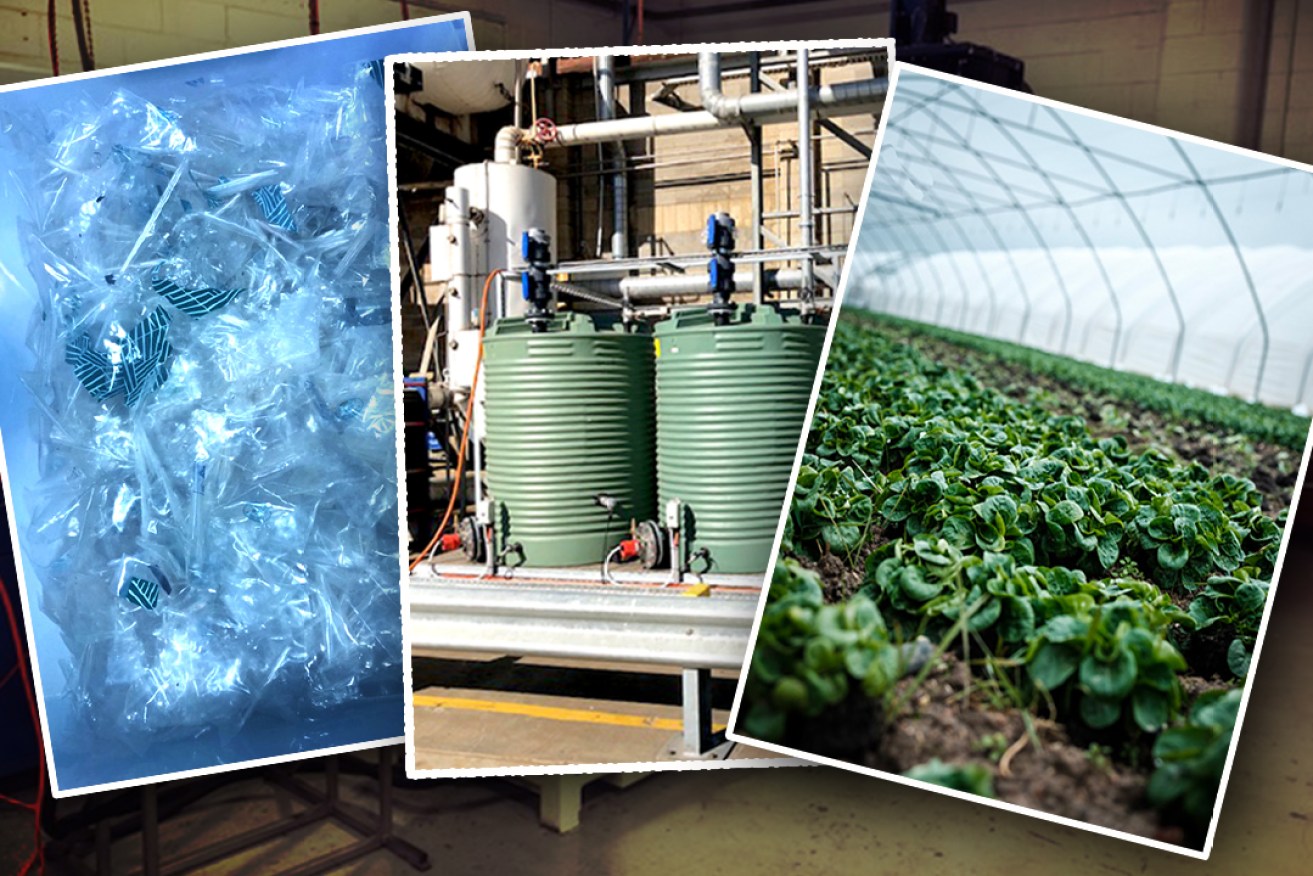Plastic eating system looks to commercial ramp up
South Australian technology that uses bacteria and anaerobic digestion to turn contaminated plastics into biogas, fertiliser and compost is undergoing commercial trials.


The Alkane technology uses special bacteria and anaerobic digestion to turn contaminated plastic into fertiliser. Image: Tom Aldahn/InDaily.
The process developed by scientist David Thompson and his company Alkane R&D is being scaled up with plans to treat up to 50 tonnes per week in one system.
The units have so far proven successful at breaking down several common household plastics including polyethylene, polypropylene and polystyrene.
Major food processor Thomas Foods International has provided Alkane with access to facilities at its former Murray Bridge meat processing site where Thompson has established a lab to conduct a series of small commercial trials.
Currently, the three-cubic-metre units at the site are capable of processing about 10kg of plastic waste per hour.
“We’ve got three of those in operation and we’ll be getting data off of those over a period of weeks to understand exactly how long it takes to digest plastics at a much larger scale,” Thompson said.
“The bacteria inside the anaerobic digesters is attracted to the waste plastic and convert it into biogas, which is a mixture of methane and carbon dioxide and also liquid digestate, which is a fertiliser and also solid digestate, which is a kind of compost.
“We take plastics that would normally go to landfill or incineration and we pre-treat the plastic and put it through the reactors for the bacteria to digest the plastic and the contaminants.
“The reason why I started this journey 20 years ago was because we are still landfilling a million tonnes of contaminated plastic each year in Australia and that’s about 26 million tonnes in the United States and eight million tonnes in the UK so there’s a continuing issue with plastics that recyclers don’t know what to do with.”
The next stage of the project is to complete the proof-of-concept scalability program and collect data from the anaerobic digestion of the plastics in the reactors at Murray Bridge.
Thompson said he hoped to attract investment or develop industry relationships, such as a joint venture, to help fast-track the commercialisation of the technology.
He said Alkane would also open up its lab to conduct testing and provide individual reports for industry on the effectiveness of the technology at breaking down specific plastics biologically.
“The potential for scalability is there, it’s all about building it bigger, or if we need multiple machines then that’s fine too. It’s all about how we make the plastic available to the bacteria that is the key,” Thompson said.
“Currently we’ve got inquiries out of India for the purchase of our systems in numbers with the first plant in Tamil Nadu being able to handle 300 tonnes per week.
“They are wanting us to demonstrate a full-blown commercial plant and they want to get on a plane and come over to touch, feel and kick a fully operational commercial plant.
“It will be our role to design and provide a system with the assistance of Australian engineering firms to build to our specifications and for us to deliver and install.”
The extension of China’s ‘Operation Green Fence’ policy came into effect in January 2018, banning the importation of 24 categories of contaminated solid waste including paper, plastics, textiles and some metals.
This caused prices for recyclable materials to crash and left waste management companies in Australia, the United States, Europe and Japan with vast amounts of unsaleable waste.
Before the ban, China imported almost 30 million tonnes of waste paper and 7 million tonnes of “recyclable” plastic a year – including about 30 per cent of Australia’s waste paper and plastic.
This is on top of the estimated one million tonnes of contaminated plastic that is deemed unfit for recycling and sent to landfill in Australia each year.
Thompson said Alkane would conduct a trial later this year on processing used blood bags that were traditionally incinerated.
“We’re adding a value to a plastic that has no value today by the recycling industry,” he said.
“Because of the amount of plastic that is no longer able to be exported, there’s a mountain of plastic that is being stored at the moment or converted into plastic benches and posts and I think people are scrambling to find better ways to handle a waste that can’t be re-processed and we’re putting our hand up to be a potential for that.”
In a statement, Thomas Foods International said it was continuously looking at ways to incorporate new and existing technologies to assist in promoting sustainability across its operations.
TFI said it was assisting Alkane in its bid to commercialise technology that it hoped could significantly reduce plastic waste within manufacturing processes.
“We look forward to learning the results of Alkane’s trials to determine whether its technology has possible applications for TFI,” the company said.
Thompson was a 2017 semi-finalist in the Australian Technologies Competition, which assesses, mentors and promotes companies providing a uniquely Australian take on the future and is open to technologies that have global potential in a range of industries.




